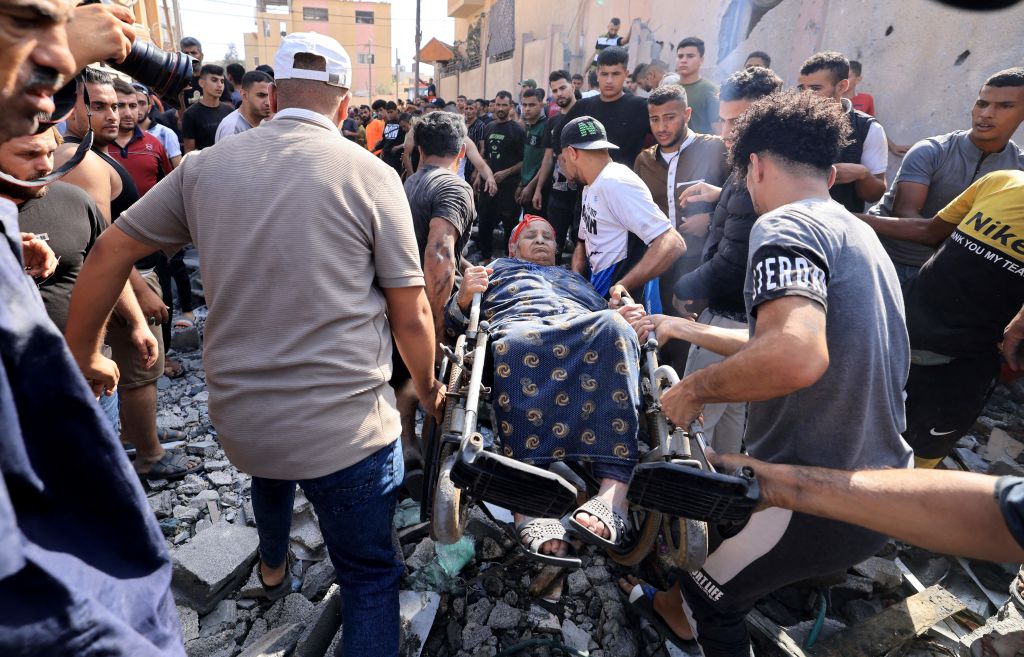People with disabilities in Gaza are suffering disproportionate harm in the Israel-Hamas war, international aid organizations warn, as a vulnerable population struggles to get the aid they need to stay safe. There are reports of two sisters who can’t hear bombs coming and a 60-year-old woman confined to a blanket in a shelter because her wheelchair broke during an evacuation.
[time-brightcove not-tgx=”true”]
On Oct. 7, Hamas launched an unprecedented attack on Israel, killing 1,400 people and taking more than 200 hostage. Since then, Israel has bombed and launched a ground operation in the Gaza Strip, killing more than 9,000 people, according to the Hamas-run health ministry.
Israel cut off water, power and fuel on the Gaza Strip, impacting a population of over two million people. Humanitarians warn that aid allowed in hasn’t been enough to meet the needs of the population. Before it began a ground invasion to fight Hamas, Israel ordered a mass evacuation from Gaza’s north, which hospitals said was impossible to comply with.
The U.N. estimates more than 15% of 1.4 million people internally displaced in Gaza have a disability. Shelters lack medical beds and supplies, causing ulcers and other illnesses that can’t be treated in unsterilized conditions.
Human Rights Watch published a report on Nov. 1 featuring interviews with 13 people with disabilities in Gaza, who opened up about the increased risks they face in the Israel-Hamas war. Such difficulties include being unable to hear the bombings or flee quickly enough in response to evacuation orders. TIME could not independently verify the accounts.
In a message to TIME, Emina Ćerimović, a Human Rights Watch senior researcher who conducted the interviews by phone, argued Israel and the U.N. had failed to uphold U.N. resolutions to protect the rights of people with disabilities and civilians with disabilities in conflict, and urged the U.S. and other allies to take steps to protect this population and lift the blockade. “People told me over and over again how they cannot survive this,” Ćerimović told TIME.
Addressing the report, Israel Defense Forces said in an emailed statement on Nov. 5 that “in response to Hamas’ barbaric attacks, the IDF is responding forcefully to dismantle Hamas military and administrative capabilities. In stark contrast to Hamas’ intentional attacks on Israeli men, women and children, the IDF follows international law and takes feasible precautions to mitigate civilian harm.”
The challenges for people with disabilities in Gaza, a frequent battleground under a 16-year blockade by Israel, is a chronic issue that has faced criticism from human rights groups.
Ziad Amro, a blind West Bank resident and president of the Palestine Association For Visually Impaired Persons who also works with nonprofit EducAid and the Independent Commission for Human Rights, says he has been in touch daily, when connectivity allows, with members of the disabled population in Gaza.
“They have no access to sources of life—food, water, communication, internet, phones,” Amro said. He also pointed out electric wheelchairs and devices to help blind people don’t work without power, highlighting the lack of mobility and accessibility for many.
Reham Shaheen, a regional rehabilitation field specialist with non-profit Humanity & Inclusion in Gaza, who’s been stuck in Jordan away from her husband and three children since the war started, told TIME that this population struggled even before the war because the blockade made it hard to respond to their needs and policies were not inclusive to grant equal rights.
People are homeless; some separated from their families, support systems and mobility devices, Shaheen said. Those with chronic illnesses, who need medical care, cannot receive it because hospitals are overflowing with critically injured patients, while others don’t have the funds to buy supplies such as catheters at pharmacies.
Two sisters, Iman and Abir, identified only by their first names, who are hard of hearing, told Human Rights Watch in a video recorded by a psychologist working in a school turned shelter that they feel isolated and helpless.
“I don’t have a hearing device, so I don’t know when they are bombing,” Iman said in the video, posted on X. “I feel the ground shaking, and I see people running without knowing what is happening.”
Others told Human Rights Watch they struggled to evacuate the bombings quickly. Samih Al Masri, 50, who said he lost both legs in an Israeli drone strike in 2008, was sheltering at al-Quds hospital in Gaza City, but feels helpless. “If they bomb the hospital, I will be dead,” Al Masri said in the report. “I know I cannot move.”
Shaheen’s colleagues in Gaza, who have pivoted to emergency response, shared in a recent report that the family of a three-year-old child with cerebral palsy had to evacuate their home, leaving his assistive device and medications behind, and he has been suffering from painful muscle spasms.
When asked about a solution, Shaheen said her first priority is a ceasefire, a growing demand by the global community. Israel has said it will not push for one until Hamas releases hostages and Western superpower leaders have pulled short of calling for a ceasefire, although U.S. President Joe Biden recently urged for a “pause” to let in humanitarian aid and free hostages.
Shaheen’s second priority is to ensure more inclusive aid reaches Gaza. Assistive devices are needed, as well as aid workers who are trained in helping people who have disabilities. For Shaheen, it is vital that data is collected about the vulnerable disabled population in Gaza, so that their needs are not overlooked in the future.

